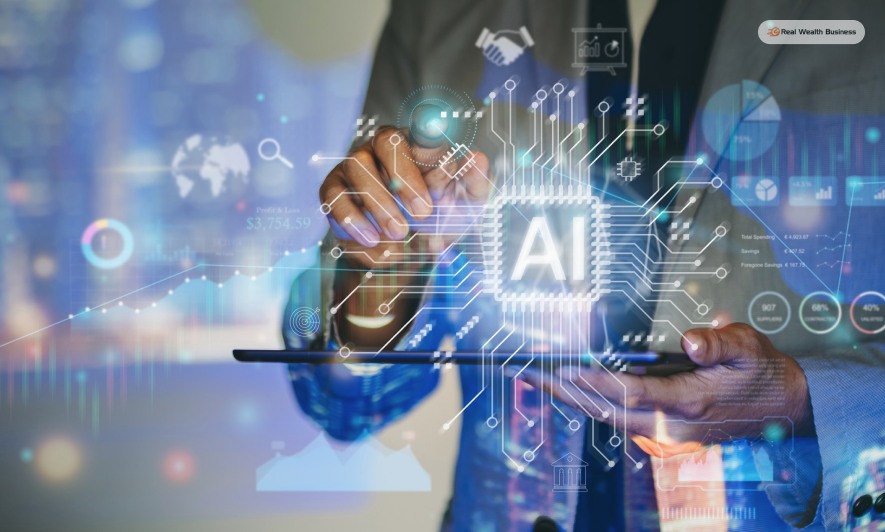AI In Business: How Is It One Of The Most Powerful Tools That Businesses Can Resort To?
by upasana sarbajna Business 12 February 2024

There is a widespread adoption of AI across business functions and industries. AI is reshaping how businesses operate. From human resources to marketing, AI is used throughout all organizations to automate their tasks, improve data analytics, and make better decisions more quickly.
Some of the major emerging trends in AI are generative AI or natural language processing loke like machine learning, ChatGPT, and deep learning.
Other than replacing the workers, AI may be used to decrease repetitive work, maximize human potential, and drive effectiveness by helping businesses and employees throughout industries operate more strategically.
Let us now have a deeper dive into the world of AI and how effective is AI in business.
How To Use AI In Business?

AI has several use cases and entrepreneurial benefits across focus areas and industries. As per research, around 50% to 60% of the companies have deployed some type of AI resources or tools.
Underneath, we have mentioned some of the most high-level ways in which you may use AI in business.
AI Automation
Whatever role you are pursuing, there must be some tasks that are repetitive and manual. These include checking emails, generating reports, and inputting data. All these activities take away a lot of time from your more impactful work.
As per research, 67% of the total respondents feel like they are constantly engaging in the same tasks and wasting an average of more than four hours every week doing tasks that can be easily automated.
AI may help automate all your routine tasks. They save time, maximize your productivity, reduce the risks of human error, and help drive the engagement of the team members by enabling them to spend their time on work that is more meaningful.
Depending on the tasks that you are willing to automate, a vast range of tools are there for different functions of business and use cases, like chatbots for customer service, payroll platforms for accounting, and applicant tracking systems for recruitment.
Enhanced Data Analytics
Machine learning tools and artificial intelligence may process and analyze wide amounts of data at speeds and scales that are far beyond the capabilities of a human. As a result, AI may result in identity patterns, trends, and behaviors that may not be immediately visible to human analysts. It would help predict the future outcomes depending on the historical data.
Some use cases for improved data analytics comprise foreseeing customer mix, projecting revenue, identifying worker turnover trends, and flagging fraud patterns and behaviors.
Improved Decision Making
Based on the inputs from the enhanced data analytics, AI may also help support improved decision-making.
AI may advance decision-making by helping customers identify the newest business opportunities, determine the effective ways in which they may personalize offerings, flag operational roadblocks, and prepare for all the potential challenges.
One of the most cited examples of how AI may support decision-making is that airline companies use predictive AI analytics to decide their pricing.
Various Uses Of AI In Business Sectors
Here is a list of the major ways one can use AI in business.
Content Generation

Content creators have been increasingly adapting to generative AI tools that may help you save time and improve the process of content generation. Tools like ChatGPT, Jasper, and Google Bard allow users to put down text prompts to rapidly generate new written format content like emails, outlines, or blog posts.
Marketing

Marketing teams use artificial intelligence tools along with machine learning algorithms to analyze data, identify customer patterns and trends, optimize marketing strategies and campaigns, and enhance the customer experience.
Here is how AI can be used in marketing:
- Enhanced competitor analysis and enhanced market research
- Better audience segmentation and personalized
- Predictive market analysis
Sales

AI-powered algorithms and predictive analytics allow the sales teams to properly understand customer behavior and preferences and automate and improve sales operations.
The use of AI in sales may include the following:
- Automating manual jobs
- Demand forecasting
- Lead scoring
- Writing and personalizing the outbound email campaigns
Customer Service

AI may help transform how businesses engage with their customers, identify all the relevant insights, and improve the customers’ experience. Some positives of leveraging AI solely for customer service may include faster response time, all-day availability and support, and opportunities to provide tailored solutions that are based on the special needs of customers.
Here is how you may apply AI in customer service:
- AI-powered chatbots
- Knowledge and self-service systems
- Enhanced analytics and insights on customers
IT Operations

In recent years, AI has become so predominant in the field of IT that it is termed “AIOps” to explain the combination of analytics, big data, machine learning, and natural language processing to automate the processes of IT automation.
AIOps allows the teams of IT operations to integrate several separate tools for IT operations using one centralized platform. It helps businesses manage the ever-expanding IT landscape even more effectively. As a result, the IT teams may easily respond to the outages, which reduces disruptions to everyday business operations.
Human Resources

Leveraging AI throughout the whole employee lifecycle, which includes sourcing and recruiting candidates, the process of onboarding, managing the records of the employees, and developing the existing team members, can help the HR teams drive a lot of efficiencies and keep the talent engaged.
As per a survey conducted by the Society of Human Resources Management on 1,688 Human Resource professionals, 85% of the respondents using AI claim that it saves them a lot of time and increases work efficiency.
Here is how AI can make Human Resources even more efficient in a company:
- Writing content for recruitment materials
- Automating candidate screening
- Driving candidate engagement
- Simplifying workforce planning
Cyber Security

No one can ever deny that cybercriminals have become a lot more sophisticated in the past few years. If you think they are still using the age-old ways to hack into systems, you are gravely mistaken. They are smart enough to fool the human eye but not smart enough to fool the eyes of automation. Therefore, using AI can reduce the risks of cyber threats.
Machine learning and artificial intelligence help cybersecurity stay far ahead of criminals, automate the detection of threats, and immediately respond to risks.
Here are a few cases in which AI can ease the risks of cyber threats:
- Detection of threat and response
- Security monitoring
- Bot prevention
Legal Departments

The legal departments in corporate sectors process and analyze huge volumes of documents and data. Instead of reviewing all the documents and finishing all the other work manually, AI can make the process simple. This allows the lawyers to spend more time with their clients, offering them valuable input and expert guidance.
“LexisNexis surveyed more than 4,000 individuals, including a mix of lawyers, law students, and consumers, about generative AI. According to the survey, 36% of lawyers surveyed have used a generative AI tool either personally or professionally and 19% already use these tools in their legal practice. Areas in which lawyers see the most potential for AI tools include increased efficiency, research, and drafting documents.”
Here is how you can use AI in legal aspects:
- Research and analysis
- Contract review and due diligence
- Automation of documents
- Compliance
Accounting

Accounting departments usually spend a lot of time doing manual and repetitive tasks. These tasks include managing payroll, data entry, and approving all expenses. By shifting to artificial intelligence, most of these tasks can be easily automated. This saves a lot of time and resources.
As per an Intuit survey conducted on 2,000 accountants, 45* percent of the total respondents prefer to invest in AI and automation tools in the upcoming years. The survey also concluded that 82% of the respondents firmly believe that technology helps create more valuable and meaningful client relationships.
Here are the benefits that AI can bring to the accounting industry:
- Automated tasks
- Streamlined payroll management
- Tax audit support
Finance

A report from PwC back in 2022 found that 52% of CFOs who participated in a survey are planning on accelerating digital transformation by using AI, data analytics, automation, and cloud solutions to help promote standardization and intelligently automate enough manual processes that exist out there.
Accepting AI in finance may help financial teams and organizations analyze different patterns from big data sets, streamline the whole process, expand decision-making, prevent fraud, and preserve compliance, among other benefits.
Here are a few ways AI can be used in the finance sector:
- Real-time data analysis
- Detection of fraud and anti-money laundering
- Compliance
- Budgeting and forecasting
Benefits Of AI In Business
While AI can be spread across all sectors of a business, it has some benefits on its own that go beyond the sector division provided above. AI is a very powerful tool that makes it even more beneficial when different business sectors use it as per their needs and requirements.
Here are the benefits of AI in business that will certainly make your opinions shift from manual to automation:
AI Helps In Improving Customer Service
AI allows for real-time interaction with customers and responds to their questions or concerns immediately. This is one great way to conduct customer service as they would not have to wait for hours to get connected to the customer service representative of the business. This will make the customer experience even better and make them come back to the business repeatedly.
AI Allows For Better Decision Making
AI can help businesses make more consistent and accurate decisions.
For instance, a business may use AI-powered platforms that make use of data from past sales to determine how many people are going to buy the product this time. Or you may use it to decide upon the products that need promotion at certain times. This would allow you to make more strategic decisions about the products that need to go for production or any other process. No more guesswork from now on.
AI In Business Helps Save Operational Costs
When businesses start using AI to automate their processes, they reduce their need to have human employees do all the repetitive tasks for them. This allows businesses to focus more on other growth areas like development and innovation.
Some AI systems are even trained to write content by analyzing data from over a thousand articles written by human writers. This means you would not even have to hire editors or writers anymore. This allows businesses to save the money needed to pay employees or to train and manage them.
AI Helps In Understanding The Customers Better
As I mentioned above, artificial intelligence may help analyze huge amounts of data and identify trends and patterns within seconds. It may help businesses find out what the customers need and what they are expecting from the business. Businesses can make use of AI systems to collect insights on customers. Then, they can use them to offer the audience their personalized recommendations.
Think about how you may show relevant content to the preferences of a customer, or the products may be paired with the products they have added to the cart. This will help you improve the overall shopping experience. It’ll also increase purchases and build a number of trustworthy relationships with the customers.
AI Helps In Forecasting Sales And Revenue
Forecasting sales and revenue is a complicated task that needs several different inputs from suppliers, customers, and employees. But this entire process can be made easy with the help of AI-powered tools.
The AI system will get to learn from all the past data. Therefore, it predicts the future depending on the company’s past. It also takes into consideration any changes which have recently occurred, or which may happen in the future.
Therefore, the AI can identify patterns in the historical data and predict the amount of money that will be generated from each product line over time. This would allow you to make more informed decisions about the levels of inventory and other aspects of the operation of the business.
The Bottom Line
AI in business is the ultimate future of AI. In the upcoming decades, AI is going to take over the manual industry, and there is no doubt about that.
AI in business is one of the most convenient ways to run a business, and the kind of profit it is going to bring in is insane. AI would also reduce manual labor. This means the companies would be able to save more money when it comes to employing and training new joiners.
For More Busines Related Information Click Below!!







































































































